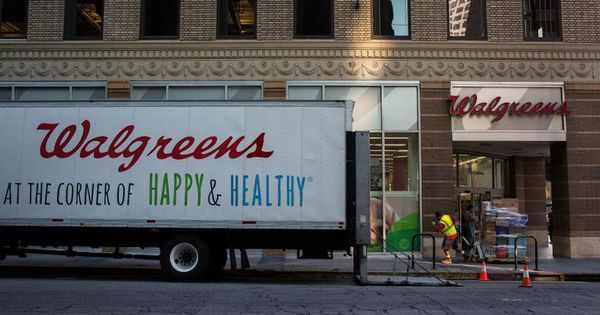
A worker makes deliveries as a truck sits parked outside a Walgreens store in Los Angeles, California, U.S., on Oct. 20, 2017. Photo: Christopher Lee/Bloomberg
In a boost for brick-and-mortar drugstore chains, J.D. Power says customer satisfaction remains high for pharmacies and the retail health services they provide.
The independent analysis by J.D. Power comes as Amazon begins to enter the U.S. pharmacy business, buying the online pharmacy PillPack earlier this summer in what some see as a potential threat to drugstore chains.
But J.D. Power’s average customer satisfaction score of 847 on a 1,000-point scale for brick and mortar pharmacies is good news for Walgreens Boots Alliance and CVS Health as they forge ahead with the strategies of adding more healthcare services inside their brick-and-mortar stores. Such scores compare with other industries J.D. Power deems “high scoring” like direct banks, property and casualty insurance companies and “full-service investment advisors,” J.D. Power said.
“Amazon, or any other organization looking to disrupt the $ 100 billion U.S. mail order pharmacy market, will have their work cut out for them,” J.D. Power senior director and healthcare practice leader Greg Truex said in a statement accompanying the report. “Legacy pharmacy players have invested heavily in delivering superior service, while brick-and-mortar pharmacies are starting to reap significant customer satisfaction gains from retail-style clinics offering health and wellness services.”
J.D. Power’s 10th annual U.S. Pharmacy study measures customer satisfaction based on responses from more than 10,000 pharmacy customers “who filled a prescription during the three months” before the May-June 2018 survey period, the company said. The survey methodology is “based entirely on consumer opinions and perception” and funded and conducted by J.D. Power.
Such consumer perceptions are key for brick-and-mortar retailers as health insurance companies who pay for medical care increasingly look at patient satisfaction as fee-for-service medicine gives way to value-based care models.
Brick-and-mortar retailers are stressing their face-to-face relationship with customers. Walgreens is testing several partnerships and this summer launched a digital marketplace that links its customers to medical care providers and their prices beyond services inside the drugstores. And CVS Health is touting its relationships with medical care providers and the potential to add more services once its acquisition of the health insurance giant Aetna is completed in the coming weeks.
The J.D. Power analysis indicates U.S. consumers “love their pharmacies” and they also like the “availability of health and wellness services,” which is an endorsement of the health clinics offered by drugstores. Customers also appreciate customer service of non-clinical staff and gave drugstores high markets if “non-pharmacist staff greeted” them in a friendly manner.
But the survey offers a challenge to online retail giant Amazon as it pushes into the mail order prescription business with its PillPack acquisition. Amazon is becoming a competitor to more established mail order businesses that J.D. Power also gave high marks including Humana Pharmacy, which scored 885, Kaiser Permanente Pharmacy (866), Express Scripts (862) and UnitedHealth Group’s OptumRx (861).
“Amazon will have their work cut out for them with regards to entering the mail-order pharmacy segment with their recent purchase of Pillpack,” J.D. Power’s Truex said. “Our study shows that groups like Humana, Kaiser Permanente, Walgreens and CVS have very high advocacy and loyalty scores, with more than 70% of their customers indicating they ‘Definitely Will’ return to those organizations. Amazon will certainly enjoy a halo-effect, but they’ll need to bring their A-game to this industry.”
